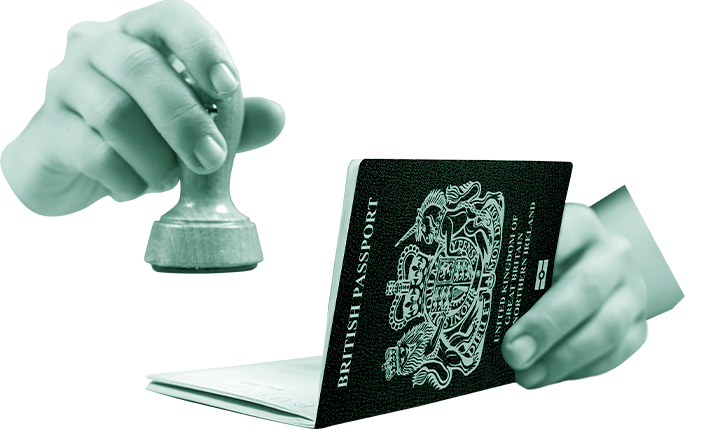Let's Talk

Need Help Urgently?
Call our 24 hour rapid response team now on 0333 311 1090
Request a callback
"*" indicates required fields


Complying with sponsor licence duties is vital for organisations in the UK that hold or are considering obtaining a sponsor licence. Failure to comply can result in the loss of the licence and the termination of contracts for sponsored employees. However, navigating the complex requirements set out by the Home Office can be challenging. While the Home Office provides immigration rules, they do not provide specific guidance on how to create systems that ensure compliance.
This comprehensive guide aims to assist organisations, whether they are applying for a sponsor licence or already have one, in understanding and implementing effective systems to stay on the right side of the Home Office. It provides insights into the principles of sponsor licence compliance, the importance of compliance, types of inspections conducted by the Home Office, different types of sanctions, and key areas organisations need to focus on to ensure compliance.
By following the guidance provided in this blog, organisations can better understand their sponsor licence duties and take proactive steps to meet the requirements, thus avoiding penalties and maintaining a compliant status with the Home Office.
Sponsor licence compliance entails fulfilling sponsor duties as outlined by the Home Office. As a licensed sponsor, organisations have the responsibility of ‘keeping tabs’ on the individuals they sponsor. This means acting as an extension of the Home Office and ensuring the sponsored workers comply with the terms and conditions of their visa. Key personnel, such as the Authorising Officer,
Key Contact, and Level 1 user, play a crucial role in managing sponsor licence compliance. By having effective systems and procedures in place, organisations can meet their sponsor licence duties and maintain compliance with the Home Office requirements.
Sponsor licence compliance is essential for several reasons. Firstly, it serves the public good by ensuring that the sponsored workers are abiding by the immigration rules and regulations of the UK. This helps maintain the integrity of the immigration system and protects the rights of migrant workers.
Non-compliance can lead to civil penalties, which can have severe financial implications for organisations. Additionally, failure to comply with sponsor licence duties can result in the refusal or revocation of the sponsor licence, impacting the organisation’s ability to hire and retain foreign workers.
The Home Office conducts inspections to assess sponsor licence compliance. These inspections can be either on-site or digital compliance inspections.
On-site inspections are a crucial part of assessing sponsor licence compliance. During these inspections, immigration officers visit the organisation’s premises to evaluate key personnel and the organisation’s practices. The goal of these inspections is to ensure that the organisation is fulfilling its sponsor licence duties and to identify any non-compliance.
During an on-site inspection, immigration officers may conduct interviews with key personnel to assess their understanding of sponsor licence responsibilities. They may also question sponsored workers to ensure they are aware of their visa obligations. The inspection can be intense and may last for several hours.
Failure to cooperate or evidence of non-compliance during an on-site inspection can result in enforcement action by the Home Office. This can include sanctions such as suspension or revocation of the sponsor licence. It is essential for organisations to be prepared for on-site inspections and have effective systems in place to demonstrate compliance with sponsor licence duties.
Digital compliance inspections have become more common, especially since January 2022. These inspections typically occur during the consideration of a sponsor licence application. After submitting the application, organisations may receive a letter from the Home Office requesting detailed information about their HR systems and how they comply with sponsor licence duties.
Organisations should ensure that their HR systems are capable of meeting the requirements outlined in the sponsor guidance provided by the Home Office. This includes maintaining accurate records, conducting proper right to work checks, and monitoring sponsored workers’ compliance with visa conditions.
Failure to provide the requested information or evidence of non-compliance during a digital compliance inspection can result in enforcement action by the Home Office.
Organisations should take these inspections seriously and ensure that their HR systems and practices align with the Home Office’s expectations to avoid penalties and maintain sponsor licence compliance.
Non-compliance with sponsor licence duties can result in various sanctions imposed by the Home Office. These sanctions can have severe consequences for sponsor licence holders.
Revocation of a sponsor licence is a severe consequence of non-compliance with sponsor duties. This sanction results in the immediate termination of the licence, leading to significant disruptions for the
organisation and sponsored workers.
When a sponsor licence is revoked, the organisation loses the ability to assign new certificates of sponsorship, meaning they cannot sponsor new workers. Additionally, the licences may be downgraded from an A-rating to a B-rating, resulting in the loss of various privileges and additional requirements to regain an A-rating.
Revocation can have serious consequences for sponsored workers, as their permission to stay in the UK may be curtailed to 60 days from the date they receive their curtailment notice. This can disrupt their lives and potentially force them to leave the UK.
To avoid revocation, organisations must diligently fulfil their sponsor duties and ensure compliance with the Home Office requirements. Regular monitoring, record-keeping, and adherence to the sponsor guidance are essential to maintaining compliance and avoiding enforcement action.

To ensure sponsor licence compliance, organisations must focus on key areas outlined by the Home Office. By addressing these areas, organisations can establish effective systems and practices to meet their sponsor duties.
One key area is carrying out proper right to work checks. Organisations must conduct these checks before employment commences, ensuring compliance with the Home Office’s requirements. Maintaining secure records of these checks and diarising any right to work expiries is crucial.
Accurate record-keeping is another essential aspect of compliance. Organisations must keep detailed records of sponsored workers, including contact details and any changes in circumstances.
By addressing these key areas and following the sponsor guidance provided by the Home Office, organisations can demonstrate compliance with their sponsor licence duties and maintain a compliant status.
Carrying out proper right to work checks is a fundamental requirement for sponsor licence compliance. These checks ensure that individuals have the lawful entitlement to work in the UK.
Organisations must conduct right to work checks before an individual commences employment. The Home Office provides specific guidance in Appendix D on the documents that can be accepted as proof of right to work.
It is essential to correctly identify the type of right to work check needed for each individual, as there are different requirements depending on their immigration status. British and EEA citizens may require manual right to work checks, while individuals registered under the EU Settlement Scheme or holding a biometric residence permit or card may require online right to work checks.
By conducting proper right to work checks and retaining accurate records of these checks, organisations can demonstrate compliance with sponsor licence duties and avoid penalties for illegal working.
Maintaining a secure record of the date of the right to work check s a crucial aspect of sponsor licence compliance. This record helps demonstrate that the check was conducted before the individual commenced employment and that the organisation fulfilled its sponsor duties.
When conducting a manual right to work check, it is not enough to simply make a photocopy of the individual’s ID document. Organisations must also retain a secure record of the date on which the check was made, including who undertook the check. This record can include a statement certifying that the right to work check was undertaken on a specific date, along with the name and signature of the person who conducted the check.
Organisations should implement suitable record-keeping systems, such as HR systems, to ensure accurate and secure records of right to work checks. Regular audits and reviews of these records can help maintain compliance and provide evidence in case of an inspection by the Home Office.
Diarising the expiry of any right to work is an essential step in sponsor licence compliance. For individuals with time-limited permission to stay, organisations must conduct follow-up right to work checks to ensure continued compliance with their visa conditions.
This is particularly important for individuals with Pre-Settled Status under the EU Settlement Scheme or those holding time-limited biometric residence permits. The duration of the right to work check should align with the duration of the grant of permission to stay.
Organisations should maintain a calendar system to diarise the expiry date of the individual’s right to work and set a reminder three months prior to the expiration date. This ensures that the necessary follow-up right to work checks are conducted, and any changes in the individual’s immigration status are promptly addressed.
By diarising right to work expiries and implementing effective reminder systems, organisations can stay on top of their sponsor duties and maintain compliance with the Home Office requirements.
The advertising and recruitment process is an important aspect of sponsor licence compliance. While the resident labour market test is no longer required, licensed sponsors must ensure that any vacancy to be sponsored is genuine. The Home Office will scrutinise whether the vacancy has been created solely for visa purposes. To prove the genuineness of a vacancy, it is advisable to provide evidence of advertising for the role(s) to be sponsored.
However, if the individual has previously worked for the organisation, advertising may not be necessary. In any case, sponsors must retain evidence of the advertisement, such as a screenshot, and keep a record of the number of applicants and shortlisted candidates. Compliance with the advertising and recruitment process is crucial to avoid penalties and maintain sponsor licence compliance.
Recording and maintaining accurate contact details of sponsored workers is an essential part of sponsor licence compliance. Sponsors must keep records of the residential address, personal email address, and telephone number (mobile and/or landline) of each sponsored worker.
These contact details must always be kept up to date. It is recommended to have a system in place to regularly check and update the contact details of sponsored workers, such as sending email reminders every four months.
In case of a compliance visit from the Home Office, sponsors must be able to demonstrate that they have both current and historical contact details of their sponsored workers. Proper recording of contact details ensures compliance with sponsor licence duties and facilitates communication with the Home Office when required.
In addition to contact details, sponsors are required to maintain detailed records related to their sponsored workers and HR practices. These records include information about absences, leave, personnel files, employment contracts, salary payments, and payslips. Sponsors must have an effective system in place to accurately record and track these details.
The Home Office may check that sponsored workers are being paid the salary stated on their certificate of sponsorship, so it is crucial to ensure accuracy in this regard. Compliance with record-keeping requirements, as outlined in Appendix D of the Sponsor Licence Guidance, is essential to demonstrate compliance with sponsor licence duties and avoid penalties or enforcement actions from the Home Office.
What triggers a compliance visit from the Home Office?
A compliance visit from the Home Office can be triggered by various factors, such as random selection, intelligence indicating non-compliance, or changes in the sponsor’s circumstances.
Compliance visits involve immigration officers inspecting the sponsor’s HR practices and documentation to ensure compliance with sponsor licence duties. Non-compliance during these visits can lead to enforcement actions, including fines, licence suspension, or revocation.
How can I make changes to the Sponsor Management System (SMS)?
As a sponsor licence holder, you can make changes to the Sponsor Management System (SMS) by logging into your account and updating the relevant information. Changes can include updating contact details, adding or removing key personnel, and reporting changes in sponsored workers’ circumstances. Only authorised officers or level 1 users can make changes to the SMS. It is important to ensure that all changes are accurately recorded in the system to maintain compliance with sponsor duties.
What are the renewal requirements for a sponsor licence?
Renewing a sponsor licence requires the licence holder to meet certain requirements. These include complying with immigration rules, maintaining accurate records, reporting any changes, and cooperating with the Home Office. The renewal process involves submitting an application, providing supporting documentation, and paying the required fees. The Home Office will assess the sponsor’s compliance with sponsor duties before renewing the licence. It is important to follow the Home Office guidance and meet all the renewal requirements to ensure the continuation of the sponsor licence.
We are always happy to talk about any legal concern you may have regarding criminal law matters.
Get In Touch

Call our 24 hour rapid response team now on 0333 311 1090
"*" indicates required fields
"*" indicates required fields